The case of a former Seattle-area football coach who was fired by a school district because he refused to stop praying on the field will be argued in front of the Supreme Court on Monday. The case of Joe Kennedy versus the Bremerton School District could have broad implications on the separation of church and state. "If Kennedy wins, it would license so many teachers and coaches across the country to pressure students to join them in their prayer and violate their religious freedom, it would practically sanction it," said Rachel Laser of the Americans United for Separation of Church and State, which represents the school district.
LINCOLN — Gov. Pete Ricketts voiced support for allowing more faith-based practices in Nebraska schools during an event Wednesday celebrating Religious Freedom Week.
Ricketts’ comments came in response to a question regarding a tweet by Republican gubernatorial candidate Jim Pillen, a University of Nebraska regent and Columbus hog producer. Ricketts, who cannot run for reelection because of term limits, has strongly supported Pillen’s campaign for governor.
“We need to put God back into our schools,” Pillen tweeted Monday. “I strongly support efforts to put prayer back into our K-12 schools. We should be teaching the next generation to love God and our great country.”
The tweet referenced news about Monday’s U.S. Supreme Court decision that determined a Washington high school football coach was within his rights to pray at midfield following football games. Pillen’s comments fueled strong backlash online, with more than 600 replies, many of them critical.
People are also reading…
Critics argued that instilling religion in the classroom would violate the Nebraska State Constitution and contradict the separation of church and state.
Matt Trail with the Pillen campaign told The World-Herald that Pillen has been campaigning to bring God back into schools since pretty much the beginning of his gubernatorial campaign. A booklet on his platform, referred to as “The Pillen Playbook,” goes more in depth, saying he wants prayer brought back into K-12 schools, specifically Christian prayer.
“The erosion of Christian faith is hurting America,” a section reads. “Secular humanism has taken over our schools because we allowed radical ideologues to silence our nation’s Christian convictions.”
Article 1-4 of the Nebraska State Constitution states:
“All persons have a natural and indefeasible right to worship Almighty God according to the dictates of their own consciences. No person shall be compelled to attend, erect or support any place of worship against his consent, and no preference shall be given by law to any religious society, nor shall any interference with the rights of conscience be permitted. ... Religion, morality, and knowledge, however, being essential to good government, it shall be the duty of the Legislature to pass suitable laws to protect every religious denomination in the peaceable enjoyment of its own mode of public worship, and to encourage schools and the means of instruction.”
Ricketts said he had not seen Pillen’s tweet, but he believes the Supreme Court’s ruling establishes the rights of students and school employees to pray on school property.
“Allowing that sort of religious accommodation is one of the things I think would be a good thing for schools to be able to think about,” Ricketts said.
Ricketts said the concept of the separation between church and state stemmed from concerns from Thomas Jefferson that the government might interfere with religion and push a specific faith on to the public. However, Ricketts argued that a separation does not mean government and religion shouldn’t be connected at all.
Ricketts pointed out that U.S. currency bears the phrase “In God We Trust,” and that the Nebraska Legislature begins each day it is in session with a prayer.
Earlier in the press conference, Rabbi Eli Tenenbaum suggested schools add a moment of silence during the day for students of all faiths to be able to reflect on their religion, and Ricketts supported this idea.
The governor later expanded on this, and said he would support letting local school boards and parents decide whether to implement a period for prayer into the school days for individual districts.
Critics of the Supreme Court ruling argued it was a departure from legal precedent. Rose Godinez, legal and policy counsel of the ACLU of Nebraska, said earlier this week the decision was “a blow to the principle that students have the religious liberty to be free from school-sponsored prayer.”
Nebraska's 10 most recent governors
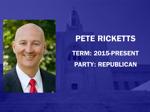
Briefly: Ricketts, whose billionaire family owns the Chicago Cubs, has won two terms as governor. He has focused on taxes, regulations and government efficiency.
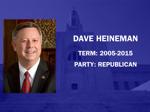
Briefly: Heineman became Nebraska’s longest-serving governor after moving up from lieutenant governor. A staunch conservative, he oversaw two major tax cut packages.
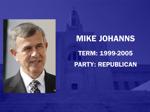
Briefly: Johanns put thousands of miles on his car campaigning for governor. A former Lincoln mayor, he went on to become U.S. Secretary of Agriculture and spent one term in the U.S. Senate.
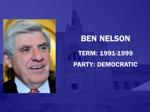
Briefly: Nelson served two terms as governor and two in the U.S. Senate. As governor, he merged five state agencies and kept Nebraska from being the site of a low-level radioactive waste dump.
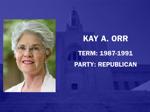
Briefly: Orr was Nebraska’s first woman elected governor. She oversaw the creation of business tax incentives and a push to increase university research. She has reemerged as a political force in recent years.
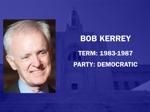
Briefly: Kerrey is a decorated Vietnam War veteran who led the state through a major farm crisis. He went on to serve two terms in the U.S. Senate. While governor, he dated actress Debra Winger.
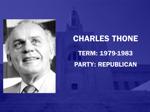
Briefly: Thone, better known as “Charley,” spent eight years in Congress before being elected governor. He focused on education and economic development.
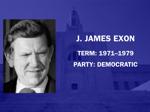
Briefly: Exon, a two-term governor and three-term U.S. senator, became the patriarch of the state Democratic Party. As governor, he was a fiscal conservative and an early proponent of ethanol.
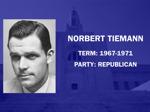
Briefly: Tiemann, a reformer, took office in the midst of a state tax crisis. His solution — creating the state sales and income tax system — cost him a second term.
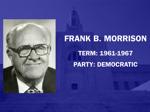
Briefly: Morrison, who served three 2-year terms as governor, was known as a tireless promoter of Nebraska. He pushed tourism and criminal justice reform.













